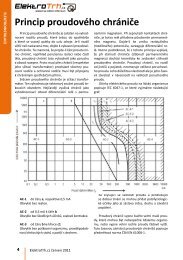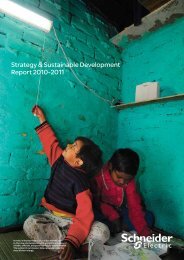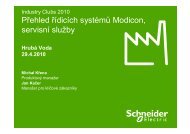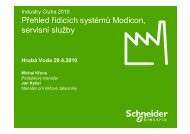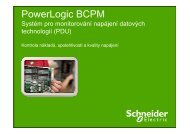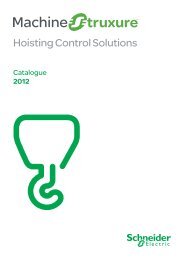2010Annual Report - Schneider Electric CZ, s.r.o.
2010Annual Report - Schneider Electric CZ, s.r.o.
2010Annual Report - Schneider Electric CZ, s.r.o.
Create successful ePaper yourself
Turn your PDF publications into a flip-book with our unique Google optimized e-Paper software.
2 SUSTAINABLE DEVELOPMENT<br />
SUSTAINABLE GOVERNANCE<br />
48<br />
> 2. Sustainable governance<br />
Governance is a set of processes, rules and laws that<br />
infl uence the way a business is directed, managed, and<br />
controlled.<br />
Reference documents are distributed throughout the Group<br />
so that all team members can embrace <strong>Schneider</strong> <strong>Electric</strong>’s<br />
responsibility approach and apply it in line with local culture<br />
and legislation.<br />
1 External and internal bases of preparation for a solid framework<br />
Our external bases of preparation<br />
The United Nations Global Compact<br />
The United Nations Global compact was launched in 1999 by<br />
UN Secretary-General Kofi Annan, the Global Compact brings<br />
companies and non-governmental organisations together under<br />
the aegis of the United Nations to “unite the power of market with<br />
the authority of universal ideals”.<br />
Parties signing the Global Compact commit to 10 fundamental<br />
principles in four areas: human rights, labor, the environment and<br />
anti-corruption.<br />
In signing the Global Compact in December 2002, <strong>Schneider</strong> <strong>Electric</strong><br />
made a public commitment to these universal values. The Group has<br />
primarily worked to share this commitment with its partners since<br />
2003 (see page 59 “Relations with sub-contractors and suppliers”)<br />
In line with the Global Compact requirements, <strong>Schneider</strong> <strong>Electric</strong><br />
publishes an annual progress report. This publication reports on the<br />
Group’s action plans and monitoring indicators for the 10 principles<br />
of the Global Compact.<br />
The Global <strong>Report</strong>ing Initiative<br />
The Global <strong>Report</strong>ing Initiative (GRI) was established in 1997<br />
as a mission to develop globally applicable directives to report<br />
on economic, environmental and social performance; initially<br />
intended for companies and subsequently for any governmental or<br />
non-governmental organisation.<br />
Brought about by the Coalition for Environmentally Responsible<br />
Economies (CERES) in association with the United Nations<br />
Environmental Program, the GRI integrates the active participation<br />
of companies, NGOs, accounting bodies, business associations,<br />
and other stakeholders from across the world.<br />
By aligning itself with the GRI in 2010, <strong>Schneider</strong> <strong>Electric</strong> reinforced<br />
its extra-fi nancial reporting. A table showing its correspondence with<br />
the GRI indicators is included at the end of this document (see page<br />
92).<br />
* Responsibility & Ethical Dynamics<br />
2010 REGISTRATION DOCUMENT SCHNEIDER ELECTRIC<br />
> VIEW ON ISO 26000<br />
In 2010, the ISO (International Organisation for<br />
Standardisation) published guidelines on organisations’<br />
societal responsibility (ISO standard 26000). ISO 26000<br />
is a compromise that gets different players from the<br />
public, private and non-profi t sectors, from around 100<br />
countries, involved, and a vision of how an organisation<br />
should view societal responsibility. <strong>Schneider</strong><br />
<strong>Electric</strong>’s actions towards sustainable development<br />
are completely in line with ISO 26000. This standard<br />
legitimises the sustainable development actions<br />
undertaken by the Group since the early 2000s and<br />
provides an educational support and framework for its<br />
actions in the fi eld.<br />
Our internal basis of preparation: the<br />
Responsibility & Ethical Dynamics* (R&ED)<br />
program and Our Principles of Responsibility<br />
What is at stake<br />
As a global corporation, <strong>Schneider</strong> <strong>Electric</strong> continuously interacts<br />
with local and international partners. The Group’s borders are<br />
expanding, its environment is constantly changing, and its societal<br />
responsibilities and activities are growing. In this international context,<br />
reprehensible behavior may be seen when the ethics inspection<br />
and prevention processes are fragile. The Group is responsible for<br />
implementing its resources to support employees in the event of an<br />
ethical dilemma.<br />
The aim of the program<br />
In 2002, <strong>Schneider</strong> <strong>Electric</strong> published a set of guidelines entitled Our<br />
Principles of Responsibility to give all team members a common<br />
reference point. The document outlines the Group’s commitments<br />
to each of its stakeholder groups: the Company’s employees, its<br />
economic partners (mainly clients and suppliers), shareholders, the<br />
community and the planet.




